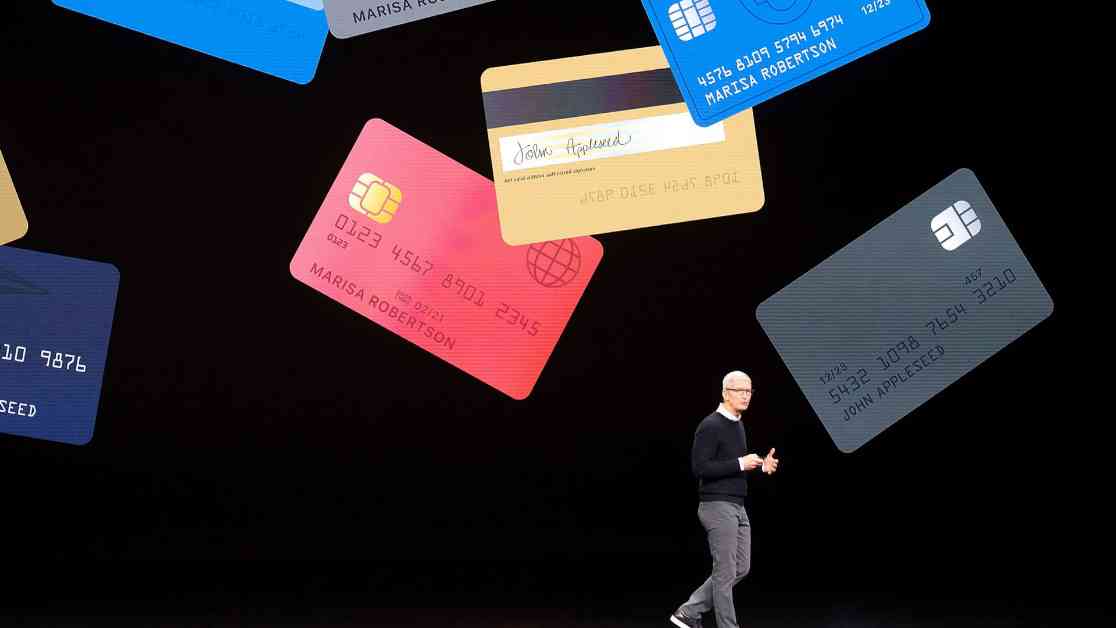Apple’s CEO Tim Cook recently introduced the Apple Card during a launch event at the company’s headquarters in Cupertino, California. This innovative credit card offering from the tech giant has been a game-changer in the financial industry, offering unique features and benefits to its users. However, recent reports have surfaced indicating that Apple is in talks with JPMorgan Chase for the bank to potentially take over the Apple Card program from Goldman Sachs.
According to a source familiar with the negotiations, the discussions between Apple and JPMorgan are still in the early stages. Key elements of a potential deal, such as the price and whether JPMorgan would continue certain features of the Apple Card, are yet to be decided. The source, who requested anonymity, stated that the talks could potentially fall apart over these or other matters in the coming months.
The decision for Apple to explore alternative options for the Apple Card program stems from Goldman Sachs’ pivot away from its retail banking strategy. With limited choices available in terms of card issuers in the U.S. with the scale and appetite to take over the Apple Card program, JPMorgan emerges as a strong contender due to its status as the country’s biggest credit card issuer by purchase volume.
JPMorgan is reportedly seeking to pay less than face value for the approximately $17 billion in loans on the Apple Card due to elevated losses on the cards. Sources close to Goldman have argued that the higher-than-average delinquencies and defaults on the Apple Card portfolio were primarily due to the fact that the users were new accounts, and these losses were expected to ease over time. However, questions surrounding the credit quality of the portfolio have made it less attractive to potential issuers, especially amidst concerns about a potential economic slowdown.
In addition to the financial aspects of the deal, JPMorgan is also looking to do away with a key feature of the Apple Card known as calendar-based billing. This feature, which sends statements to all customers at the beginning of the month rather than staggered throughout the period, has proven to be appealing to customers but has resulted in a surge of calls to customer service representatives at the same time every month.
Both Apple and JPMorgan have declined to comment on the ongoing negotiations, as reported by The Wall Street Journal. The potential takeover of the Apple Card program by JPMorgan marks a significant development in the financial industry and could have far-reaching implications for both companies and their customers.
Implications for Apple and JPMorgan
The potential takeover of the Apple Card program by JPMorgan could have significant implications for both companies. For Apple, this move could help alleviate some of the challenges and losses associated with the Apple Card program, which had previously been a burden for Goldman Sachs. By partnering with JPMorgan, Apple could potentially leverage the bank’s expertise and resources in the credit card industry to improve the overall performance and profitability of the Apple Card.
On the other hand, JPMorgan stands to benefit from the acquisition of the Apple Card program by expanding its credit card portfolio and customer base. As the country’s largest credit card issuer, JPMorgan has the infrastructure and capabilities to manage a program of the Apple Card’s scale and complexity. By taking over the Apple Card program, JPMorgan could strengthen its position in the credit card market and enhance its competitive edge against other financial institutions.
Impact on Customers
The potential takeover of the Apple Card program by JPMorgan could also have implications for customers who currently hold Apple Cards. While the details of the deal are still being negotiated, customers may experience changes in terms of service, features, and benefits offered by the Apple Card. JPMorgan’s decision to potentially do away with calendar-based billing, for example, could impact how customers receive and manage their monthly statements.
It is important for Apple Card users to stay informed about any updates or changes that may result from the takeover by JPMorgan. Keeping track of communication from both Apple and JPMorgan regarding the transition process and any adjustments to the Apple Card program will be essential for customers to understand how their credit card experience may be impacted.
Market Trends and Economic Outlook
The discussions surrounding the potential takeover of the Apple Card program by JPMorgan reflect broader market trends and concerns about the economic outlook. With fears of a possible economic slowdown looming, financial institutions are reevaluating their strategies and risk exposure to navigate uncertain times. The decision by Goldman Sachs to pivot away from its retail banking strategy and potentially offload the Apple Card program underscores the challenges faced by banks in a volatile economic environment.
As JPMorgan seeks to acquire the Apple Card program at a reduced price due to elevated losses on the cards, it highlights the importance of credit quality and risk management in the credit card industry. The impact of higher delinquencies and defaults on the Apple Card portfolio on potential issuers underscores the need for financial institutions to carefully assess and mitigate risks in their lending practices.
In conclusion, the ongoing negotiations between Apple and JPMorgan for the potential takeover of the Apple Card program signal a significant development in the financial industry. With key details of the deal still being ironed out, it remains to be seen how the partnership between these two industry giants will unfold and what implications it will have for customers and the broader market landscape. Stay tuned for updates on this evolving story as more information becomes available.






















